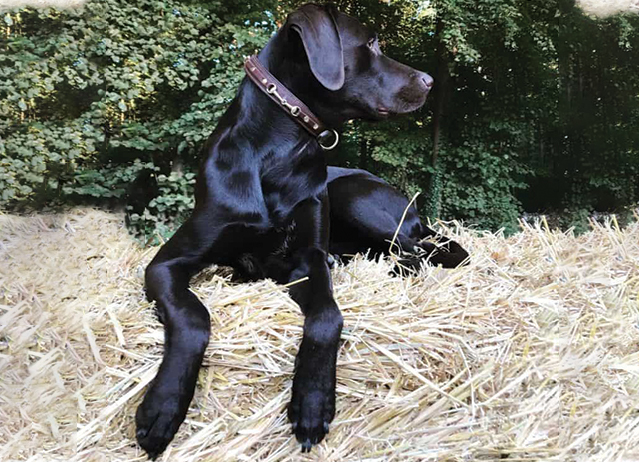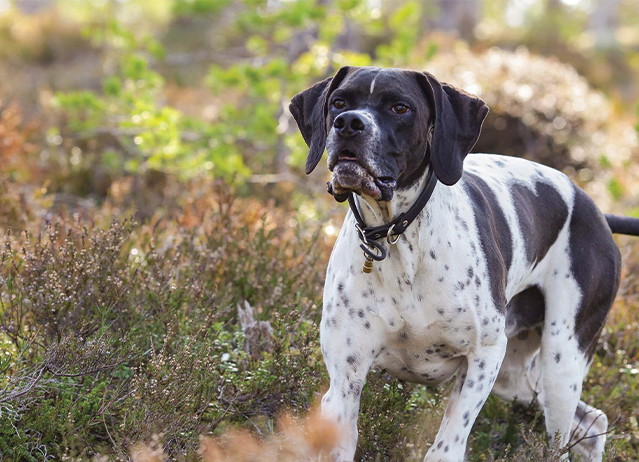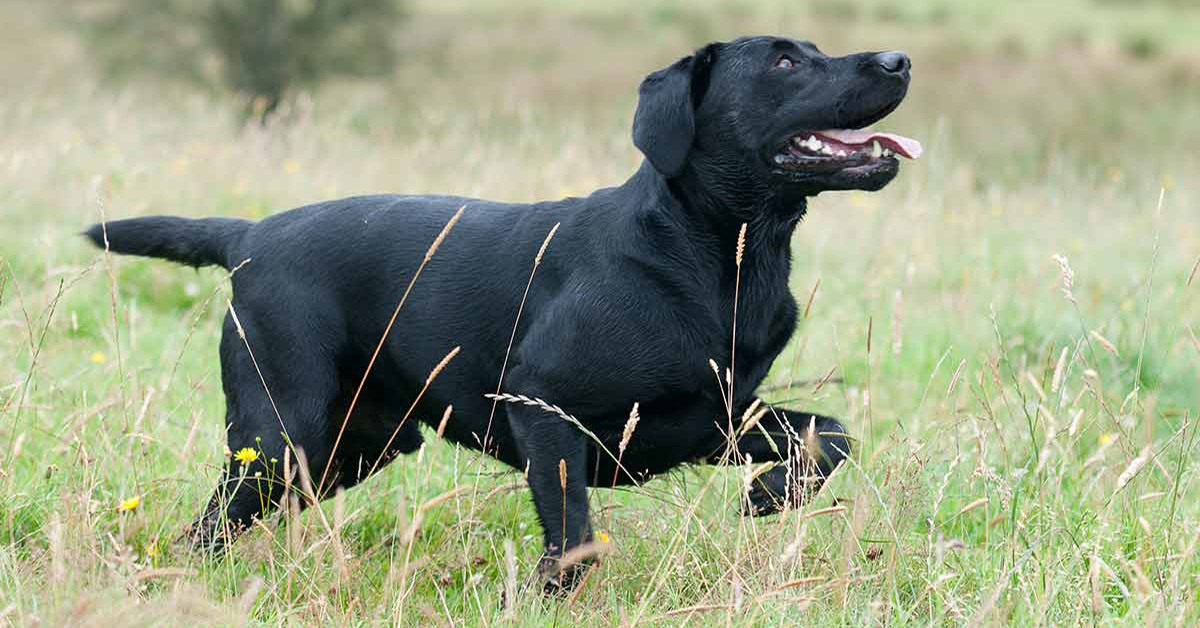About Lab Pointer
| Height | 22-25 inches |
| Weight | 35-50 lb |
| Lifespan | 10-15 years |
| Group | Not Applicable |
| Best Suited For | active families or singles, first time pet owners, owners with a fenced yard |
| Temperament | Gentle, Intelligent, Playful, Friendly |
| Comparable Breeds | Labrador Retriever, Pointer |

Lab Pointer Dog Basics
The Lab Pointer dog combines two tender dog breeds: the Labrador Retriever and the Pointer. This makes an intelligent, dynamic dog perfect for lively families with kids and other pets. Even first-time pet owners will discover the Lab Pointer dog a great partner. This dog gets along well with other animals and has a pleasant, playful nature, making it an excellent running or jogging partner.
Origin
The Lab Pointer is almost a new breed, likely appearing in the 1980s when designer dogs became popular. Breeders started mixing pure-blooded dogs to combine their best physical features and personalities while trying to decrease health issues. For all being a young breed, the Lab Pointer dog has a well of inheritance. The Labrador Retriever, a parent breed, falls from 19th-century Newfoundland, where fishermen used them to drag nets, and ropes, and grab fish. The other parent, the Pointer, may date back to the 16th century, brought to England from Spain and Portugal for their great hunting skills.
Lab Pointers are known for their sociable and loving nature, making them very friendly to families. They are also highly trainable, thanks to their intelligence and fervor to please. Their high energy levels mean they need a lot of exercise, so they are good for energetic owners.
Pedigree
These Dogs can’t join the American Kennel Club (AKC) because they are considered designer dogs. However, both of their parents are part of the AKC. The Pointer became part of the “sporting” group in 1884 and is known for being calm, faithful, and diligent.
Food/Diet
A moderate-sized dog like the Lab Pointer dog needs 473.176ml to 709.765ml of high-quality dry food daily. It is necessary to choose the food that is good for your dog’s size, activity level, growth, and weight. It’s also important to avoid constantly leaving food available for Labs as they tend to overeat and become overweight. Steer clear of foods high in carbohydrates and grains since they may cause your dog to feel satiated with less food. Seek for dishes that list “meat” as the primary ingredient. Food containing glucosamine is a smart alternative because Lab Pointers may suffer joint problems. Additionally, avoid scheduling walks or active play shortly after meals because this breed is prone to bloat.
Lab Pointers are intelligent and vivacious, which makes them ideal for homes with active members.
Training
The Lab Pointer dog originates from two highly intelligent breeds that are known for their field-ready behavior. However because Lab Pointers are frequently distracted, it can be hard to train them to remain focused. Since they are usually shy, it is important to socialize them so they feel comfortable among people and other animals. During training sessions, your dog will need hard but constant direction. You’ll get the best results if you follow an approach that’s rewards-based and includes lots of treats and praise.
Weight
The Lab Pointer dog is viewed as a medium-sized breed and when completely developed, will weigh 35-50 pounds depending upon orientation.

Temperament/Behavior
The Lab Pointer dog is a friendly, entrusting breed with an anxious-to-satisfy character and a serious level of devotion to his family pack. While he believes himself to be a key and adored relative, he isn’t a firm variety and has a free nature that hints he is open to being left all alone for more than a couple of hours. Since he has acquired a fairly raised sense of smell, the Lab-Pointer makes for an incredible guard dog who will not hold back to respond on the off chance that he tracks down what he feels is a burglar. All things considered, he is certainly not a forceful variety and will essentially bark or narrow to alarm you.
Common Health Problems
Lab Pointers are for the most part very good and are not known to experience the ill effects of direct disorder anyway pet guardians should constantly look at their dog’s heredity to find out about potential medical problems. On this occasion, both the Labrador retriever and the Pointer can experience the ill effects of hip and elbow dysplasia. The Pointer is likewise known to be inclined to gastric twist (swell) and hypothyroidism.
Life Expectancy
The Lab Pointer has a future of 10 to 15 years.
Exercise Requirements
The Lab Pointer dog is a mix of two wearing gathering canines so nothing unexpected that he is an exceptionally dynamic kid. He will require day-to-day lengthy strolls to assist him with consuming a portion of his energy and remaining truly and intellectually solid. Dynamic recess with kids and different canines will assist him with fulfilling his requirement for social association and give assortment to his activity routine. Note that he has a high penchant for meandering, so on the off chance that you visit a chain-free zone, make certain to watch out for his whereabouts.
The Lab Pointer dog is a well-disposed, entrusting breed with an anxious-to-satisfy character.
Recognized Clubs
Otherwise called a Pointerdor, a Labrador-Pointer, and a Labrador Retriever Pointer Blend, the Lab-Pointer’s fashioner dog pedigree implies he can’t join the American Pet Hotel Club (AKC) but he is an individual from the American Dog Cross Breed Club (ACHC), the Creator Dog Pet hotel Club (DDKC and the Dog Library of America, Inc. (DRA).
Coat
Lab Pointers have a short, thick, waterproof twofold coat that requires moderate preparation as standard day-to-day brushing. He is viewed as a moderate-shedding However, that can change during spring and fall shedding seasons when you will end up vacuuming habitually. He doesn’t need skilled make-ready, but because this is a floppy-eared variety, contaminations can happen so ears ought to be checked and cleaned routinely to keep away from the development of wax and garbage.

Lab Pointer Mix Puppies
Lab Pointer mix puppies are sharp but mentally absent so as previously discussed, plan to start their socialization and obedience coaching early to bring out the very best in your puppy. The Lab side of this pup is known for over-eating so feed him a few times throughout the day compared to free-feed. Because the lab pointer mix puppies come from two breeds known to have joint problems later in life, resist the desire to tire themselves out with lengthy walks or limitless play that might cause injury.
3 Little-Known Facts About the Lab and Pointer Mix Dog
1. Labradors Love the Water and So May Lab and Pointer Mix Dog
Commonly, the Labrador Retriever enjoys spending lots of time in the water. These are good dogs for people who love the outdoors. In most conditions, the same may be said about the Lab Pointer. Many Pet owners have come to notice just how much these dogs love to spend time in the water. This could be a result of their parent breed, the Labrador Retriever.
Sporting Is in Their Blood
Lab Pointer mixes were created to be runners from birth. As a mix of the Labrador Retriever and Pointer, which are both known for their sporting abilities, the Lab Pointer is born to be a sporting and active dog. They are hardworking and faithful to their owners which makes them good house dogs or working dogs, whichever is required of them.
3. Pointer Dog Lab Mix Aren’t as Timid as the Pointer
While Pointers are hardworking dogs, they are also known as the calm, fearful dogs in this mix. In most cases, however, Lab Pointer puppies don’t take those habits after their parents. Just the opposite, these dogs are mostly outgoing and love to be part of the family.
Related: Scoodle

